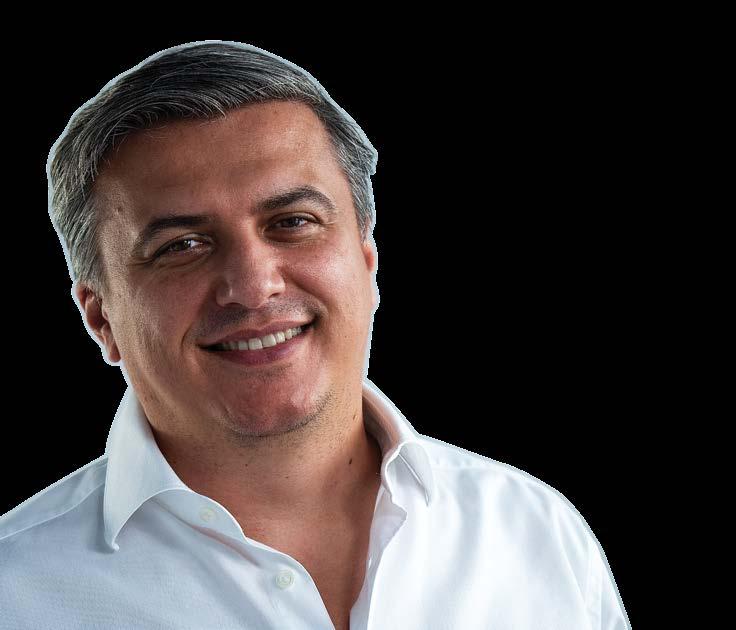
10 minute read
Kinguin
Viktor Wanli Kinguin
Creating the Esports Performance Center
Advertisement
AUTHOR Adam Fitch @byadamfitch
aving been in the industry for longer than most, Viktor Wanli is a mainstay in esports. From sponsoring the most prominent teams and tournaments to forming a recently re-branded competitive organisation of his own, Wanli has tried his hand in many sectors. Kinguin was founded in 2013 as a trading platform but didn’t waste much time in investing in esports in a big way, especially with Team Kinguin - which is now known as devils.one. H
Here Wanli details the experiences, challenges, and triumphs behind Kinguin’s Esports Performance Center - a facility located in Warsaw, Poland - which is dedicated to the improvement of the industry’s top teams. Wanli will take to the stage at ESI London in September 2019 to discuss this, and answer any questions on it.
The Esports Journal: When did the idea for the Esports Performance Center come about? VW: Esports is not really new to me. I’ve always been an insider, and I would say I managed successfully to join both of the cultures because Kinguin, as a business concept, revolves more around the casual gamer. Even for today’s esports startups, it’s tough to have a proof of concept and go on any substantial and fair valuation about these concepts.
Kinguin has always been positioning itself around unique projects in esports, being one of the very first companies to sponsor teams on a very high level — including Team SoloMid, Cloud9, Fnatic, and Ninjas in Pyjamas. Later on, we turned to sponsor tournaments such as ESL One. Lately, we’ve been working a lot around two topics in esports: infrastructure and education.
In terms of infrastructure, we first started thinking of an esports entertainment concept — a retail concept. We defined our goals and values for the project, and we actually started to look for the first location in Warsaw, Poland.
That search actually took us about one and a half years because we have very specific demands about the space in terms of location, availability and construction demands. We found such a location in the centre of Warsaw, however, that later had been called off. Thankfully, we ended up finding the current location of the Esports Performance Center by accident.
It came very naturally to us, with a concept where esports professionals can find a dedicated space — a curated, private environment. I’ve been working with teams and boot camps for a very long time, so I watched the behaviour patterns of teams and their demands and requirements of such a space. So we knew that we definitely wanted a residential and training space to be in the same facility. However, they should also be separated from each other, so they know when they are at work, when they are training, and when to spend time relaxing and having fun with friends. So we enabled the teams to define these boundaries.
ESJ: Can you break down for me what the EPC comprises of? VW: It comprises of four floors. We have an office floor which is for back office management. We have a training floor, which we call the ‘performance floor’, it’s where all the training rooms are located, and it contains room for psychologists and therapists with the support of basic facilities like a kitchen and lounge where they can discuss a strategy and their approach to the game.
Then we have the living quarters, which consists of private rooms which are equipped with individual air conditioning with Netflix and a PlayStation 4. They have all the facilities they would need to have a rest or have some additional entertainment if they would like that. It’s supported by a professional kitchen where we serve breakfast and lunch. This is led by a local chef and supports the healthy nutrition of the professionals. Then we, of course, have a gym. We offer additional packages in terms of guided physical activity, but they are free to access the gym 24/7. That’s one of the beauties about the whole concept; we have everything they could ever need inside. They can go through the facility as they like, there is security 24/7. The last floor is a chillout zone. We also look at this as where business and esports meets. Just today we had a viewing party for fans, business associates, and media of the Ultraliga — which is the Polish national competition for League of Legends.
ESJ: What makes the EPC different from other centres and headquarters owned by other organisations? VW: An organisation’s headquarters is usually a very simple facility. So, in most of the cases, it consists of a small detached house. The main differences are the level of comfort, the separation of work from fun and from their private life. This is more possible in a facility within 2000 square meters than it is if you have a house of, let’s say, 300 square meters.
We have staff which clean through the rooms daily and provide the support for the teams to do whatever they need to do — not in terms of the facility itself, but also in communication with the outside world, whether that’s visits to the city, transportation, and so on.
ESJ: What are you most proud of when it comes to the EPC? VW: I’m most proud of the team which actually made it happen in the end because mostly I was just walking around looking at stuff. The guys really made it happen, it took us a long time but what’s interesting is that we had to change lots of the first assumptions we had about the space.
It’s been verified by the professionals themselves; the usage and design of the space. We were lucky enough to actually be able to do these modifications on the go which was a huge lesson in itself. So the final thing coming together is like a dream come true and not just for me.
ESJ: How much input did professional players have in the facilities available in the centre? VW: I’ll give you a very specific example. When you plan a space, you try to make it as efficient as possible. So, for example, this very room we’re sitting in was actually supposed to be two rooms. We had the devil.one’s CS:GO team ‘bootcamping’ in the facility, but it wasn’t really finished.
They chose to spend their time relaxing in this room - which is a lot smaller than our largest training room - so I

was curious about the specific reasons behind it. I asked why they chose this room instead of the bigger one, and they explained that if they were in a big room, they would be actually most of the time staring into monitors anyway. They loved how open this space was and categorically told us not to divide it by any means.
They felt thrilled to come into this room where it’s a more relaxed, lounged style instead of sitting around the table to discuss things. We listened!
Is the EPC open for business at it stands or is it more of a case-by-case basis as to who can stay and practice here?
This facility as a business concept has certain fixed costs. We have to be realistic about the tenants of the facility. So, from a business point of view, there are only a few organisations in the world right now which can afford to come to a boot camp of this scale.
Most of the leading local newspapers, even the mainstream newspapers, have already informed local teams of the facility. On our side, though, we’ve been mostly reaching out to specific organisations. I believe we have really been successful with the organisations we’ve housed so far and have helped them fulfil their mission.
ESJ: Has the centre created new jobs? VW: Lots of service jobs. I think the facility now employs around ten people full-time for cooking, cleaning, servicing the apartments, the concierge service for the teams, and so on.
ESJ: What would you say has been the biggest challenge with the EPC?
VW: Everything has gone relatively smoothly, to be honest, but gaining the permits for the residential quarters was somewhat of a challenge. It’s really unique to this building that we’ve been able to obtain these permits because it’s both a hotel and an office. All the regulations with the fire department and so on were slightly challenging.
ESJ: Was there anything that you wanted to include or build that you just couldn’t do execute? VW: Personally, I would like to have more training rooms in the facility because we have much more demand than we can currently to fulfil. The whole centre is designed to house four teams with their support staff comfortably. So four teams can have excellent training in the facility comfortably together at the same time. I wish we could have another training space, to be honest.
ESJ: How has the centre been received by people in the surrounding area that are not aware or involved in esports? VW: We definitely don’t have any complaints. The area around us consists mostly of other office spaces or hotels because we are quite close to the airport from here. It’s only about 15 minutes to get to the airport.
There is a very low residential presence on the other parts of the highway, so when it comes to the local authorities, we can also promote it by them, and I think we’ll see more of that. I think overall we definitely have made a positive impact on the community around us.
ESJ: Is there any scope for specific sponsors and partners of different rooms in the centre? VW: We haven’t officially announced any of those just yet. We’ve been really busy getting the concept right before getting involved in promotions with other partners. Definitely, we have upcoming showcases of technological partnerships and educational partnerships — especially with some of the largest universities in the country but also with many of the high schools here in the city. So it’ll be mostly technological and educational when it comes to partnerships in the near future.
ESJ: Do you see the EPC as a potential chain that can be located in countries around the world? VW: I never think of a business as just a local thing; I always try to think in global terms. Thinking of this as a chain, we know already that there are similar a few facilities around the world which are being constructed.

We are in talks with most of them, and we have this idea to bring a chain forward, but I’m working on the values and the basic concept of such a chain. Our goal is to promote unified standards when it comes to giving the teams opportunities so they can have similar

expectations towards different parts of the chain.
The service component here is extremely important; this is what we are trying now to define. We are also new to the business of hospitality despite having experts hired from the industry. Really, we are still at the very early stages of understanding hospitality in esports.
ESJ: Do you find esports business conferences beneficial and fit for Kinguin, what do you get from them? VW: It’s very good that esports is finally getting the attention it deserves in terms of business opportunities — whether it’s to meet each other regularly
through different esport conference events or to meet newer parties that are trying to understand esports. Sharing these experiences together and with non-endemic brands is extremely important, I can’t imagine going forward without them.










